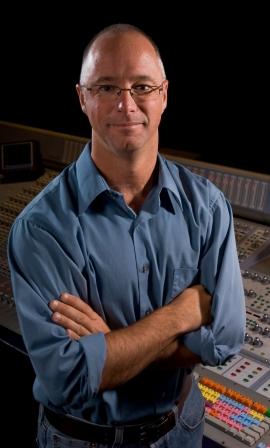Some people collect dirty magazines or garden gnomes. David Raines collects sound.
On a brief sojourn from work., the sound re-recording mixer travelled around the country adding to his collection.
“I’ve been shooting sound all over Australia,” he tells IF. “The sound here is very different to the sound in the States. The birds, the sounds of the trains here, the sound of police sirens. They’re all different.”
“I shot some stunning sound the other day at one of the bridges around Sydney – when it closes, it makes a stunning sound. And I remember that sound from 20 years ago when I lived here.”
This awareness of the background noise of daily life has helped Raines carve out a successful career in the television industry. Since leaving the local industry in Sydney, he has worked a sound re-recording mixer for a number of high profile shows including Smallville, Burn Notice, White Collar and NCIS: Los Angeles.
In January, he received a nomination for the Cinema Audio Society Sound Mixing Award for baseball film Calvin Marshall.
“The craft is combining the three elements of dialogue, music and effects,” he explains. “It’s the balance of those three elements. And of course, within those three elements, there’s hundreds, sometimes thousands of elements that make up the ingredients of each of those three buckets.”
Raines got his first real break in the industry after moving to Los Angeles following a stint in Vancouver.
“I knew there wasn’t much of a sound industry or post production in Vancouver,” he says. “It’s a lot like Australia.
“I ended up with all my clients in L.A. So after about four or five years, I was like “wait, why am I here?”
It was a move that proved fruitful, but one that has required Raines to be constantly adapting to the fast paced workings of television land.
On a standard series a two man mix team is given twelve hours to mix a forty five minute episode.
“We haven’t seen the print before it shows up,” says Raines. “After twelve hours, your executives want to come in and you better have something ready.”
In the past, this high pressure deadline was shouldered by a three member re-recording crew. But due to shrinking budgets, this particular business model has changed.
“With computers and technology, technically you can do things faster, but what really happens is that you just do more,” Raines observes.
Raines is most excited about upcoming U.S. series Hell On Wheels. Set shortly after the American Civil War, against the backdrop of the building of the Transcontinental Railroad, the show will follow a Confederate soldier’s quest to avenge his wife’s murder. After working as the lead mixer on the pilot last year, Raines has high praise for the production.
“I did a short film with Steven Spielberg and the only tracks I’ve heard that were better than this were Steven’s,” he says. “I do a lot of television and that was the best track I’ve ever heard.”
He believes that Hell on Wheels stands out because of the production team's awareness of sound.
“There was an understanding of the sound and how it would contribute to the final track,” says Raines. “The sound crew was switched on, but more importantly, so were the directors and producers.”
So what’s next on the agenda for the man that lives, breathes (and hears) sound?
“I’m going up to the coast to record Californian sea lions,” he says.
Of course he is.
David Raines


